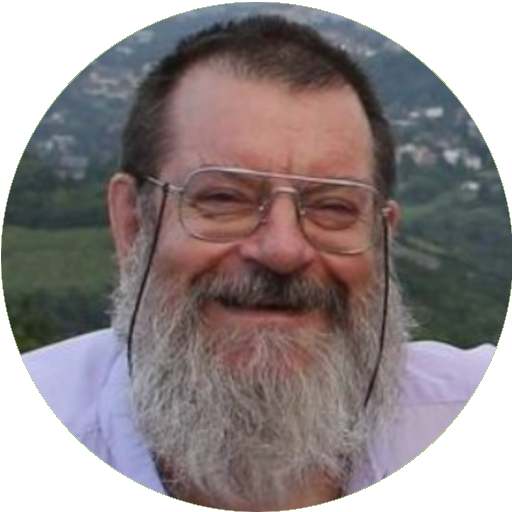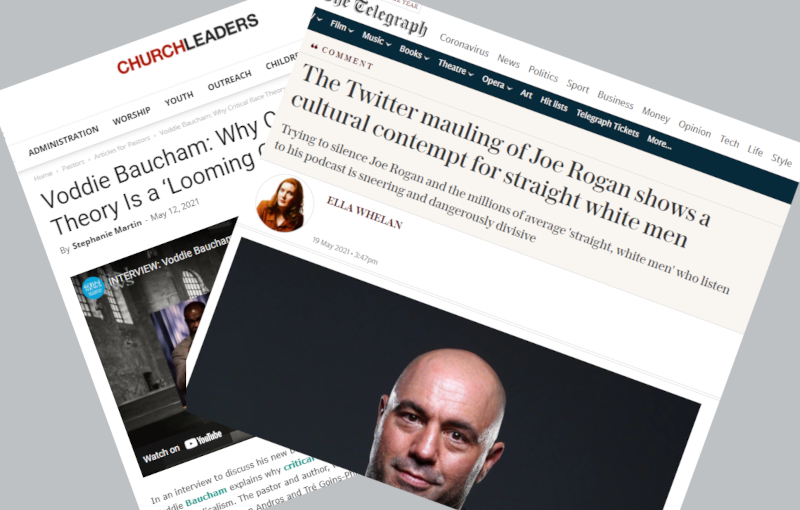Let’s get this out of the way first: I am so sorry for the Trump reference in the title of this post—it does not refer to the former POTUS but is a quote from one of the articles I refer to in this post.
In an opinion column in today’s Daily Telegraph (unfortunately behind a pay wall for many) spiked columnist Ella Whelan comments on The Twitter mauling of Joe Rogan in the wake of the US comedian and podcast host suggesting that «the trajectory of “woke” culture is such that eventually “straight, white men won’t be able to talk”».
Her article illustrates and confirms something American theologian Voddie Baucham said in a recent interview (text summary / video) with Church Leadership Magazine and in his book, Fault Lines.
Here is the section from Ella Whelan’s column in the Telegraph:
According to some Black Lives Matter activists, white people need to “sit down” and stop talking about race. Feminists have long argued that men need to “lean out” or “shut up” and listen to women when it comes to issues relating to women. Transgender activists claim that any non-trans person deviating from the repetition of their “trans women are women” mantra must be a bigot, and therefore should be silenced. Teenage climate activists tell us we should be quiet and “listen to the science” rather than debating the best way to tackle environmental challenges.
In a recent online debate on intimacy during lockdown, I was told I couldn’t possibly comment on the benefits of dating apps for sexual exploration because I am married. In almost all aspects of contemporary politics, lived experience has trumped open debate, meaning that unless you fit into whichever identity or experience is being discussed, your views are deemed less valid.
In the interview in Church Leadership Magazine, Dr. Baucham discusses Critical Race Theory (CRT) which underpins the current social justice movement. He says it isn’t just a pseudo-religion but is rather its own religious movement. It has all the trappings of religion, a point which even atheists have made. The movement has its own cosmology, its own saints, its own liturgy, and its own law.
And here is the section where it meshes perfectly with what Ella Whelan says in her column:
What we have in our culture is not an objective truth, but we have a cultural hegemony that is designed for the purpose of oppression. Because of this we have to look at other ways of knowing. This is where narrative becomes very important, story telling becomes important, it’s one of the central tenets of Critical Race Theory. So in Critical Race Theory, if you want to know the truth when it comes to race and racism, you have to elevate black voices, you have to listen to the voice of the marginalized. And this is what people are talking about in church today, right: We have to listen to black voices, we have to elevate the voice of the marginalized. Well, in Critical Race Theory we do this because that’s the way you know truth—not through knowing God, not through knowing God’s Words, but through listening to the voices and the experiences of the people who we determine to be marginalized.
So, even when we talk about having the conversation—and people will say, “You’re just trying to shut down The Conversation About Racism!”—that’s rooted in principles of Critical Race Theory, that’s saying that storytelling is the way we find knowledge and not through pursuing objective truth.
Since narrative, story telling, are the ways to find true knowledge, when folks tell their story they must be believed, their story must be taken at face value, however much it flies in the face of your own experience, of objective—even scientific—knowledge, or revealed truth.
But because it is only the narrative and the stories of the oppressed and marginalized, whether it be people of color, women, or those who identify with “alternative sexualities”, only their stories are worth listening to, and others, especially privileged white males, need to shut up rather than contribute their own experiences or opinions.
And finally, even those who belong to the oppressed and marginalized groups are only welcome to tell their stories and experiences if they fit into the grans narrative of Critical Race Theory. A black man, like Dr. Baucham, who tells a different story is dismissed as having “internalized racism.”
This edict, that all who are not fully supportive of the narratives and stories considered authentic voices of the oppressed need to be silenced, is at the root of what has come to be called the “cancel culture”, with the “de-platforming” of speakers who represent contrary views.
One of my own observations, and which all this bears out, is that it is typically those who call for tolerance and even affirmation of their own views and positions end up most intolerant of other views and positions. Even Christians are guilty of this: demanding freedom of religion for Christians in places like Saudi Arabia, India, Pakistan, etc., while at the same time discriminating against followers of visibly foreign religions in our own countries. It seems to be part of our sinful human nature.

